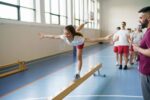In preparation for the launch on September 15 of National Online Learning Day, a day to celebrate the achievements of online students, I began thinking about these kids and the online student stereotypes they face. I was homeschooled before the days of online learning, with the exception of teaching myself HTML on my Tandy computer.
However, as a homeschooled child, I faced many of the same stigmas and stereotypes that online students face today. Here are a few stereotypes of online students that are exactly what I dealt with as a kid (and actually still deal with today when people are surprised to find out I was homeschooled).
Online students wear pajamas all day.
I think one of the oldest jokes I heard time and time again was that I didn’t have to worry about getting dressed because I could just wear my pajamas all day. This was followed up with overall perceptions that I didn’t have to work as hard and that I was in some ways lazier than brick-and-mortar students.
Not saying that every family is like mine, but in my experience, I was required to be up and dressed in time for breakfast. There was no laziness in my day whatsoever, as school work began immediately and continued until I had completed everything. There were days I was done earlier in the afternoon, but there were also days I was still working into the evening hours.
Yes, online students do have the option to wear whatever they want, but the associated stereotype that they get to be lazy and lounge around all day is definitely not the case. They have schedules to follow, deadlines to meet, and schoolwork to complete just like any other student.
Online students don’t have any friends and are socially awkward.
Obviously, most of us go through awkward phases, especially around the middle school years. This would have happened to me whether I was homeschooled or not, though. I was definitely still able to have friends, as I participated in church groups and events, joined in on activities with fellow homeschool families, and even took a couple of extra credit classes at my local high school. Just because I was learning at home during the school day did not limit my ability to cultivate friendships and engage socially with those friends.
I know another concern along these lines is the inability of online or homeschool students to participate in any sports other than community or church leagues. Many school districts allow these students to join school athletic teams or clubs, although laws/guidelines vary state-by-state as seen in a report issued in June by the Home School Legal Defense Association.
Ever heard of Tim Tebow or Simone Biles? Tim Tebow was the first homeschooled football player to win the Heisman Trophy, and Simone Biles has been able to pursue her gymnastics career thanks to homeschooling. Simone was nominated this year for an ESPY Award for “Best Female Athlete” and just took home 4 gold medals from the Olympics in Rio. Based on their remarkable successes, I would consider both of them pretty well-adjusted.
Online students quit public school because of their religion.
Even though my father is a pastor and I was raised in a Christian home, religion was not the only motivator for my parents’ decision to homeschool. They did have objections to certain curriculum being introduced in our local school system, but they also highly desired more accelerated learning. Both my brother and I were identified as gifted students, and my parents felt as if the quality of education being offered was not high enough.
This is the case for many online students as well. Self-motivated students wanting to pursue more challenging coursework find that the ability to take online classes, or even college courses, allows them to advance beyond the limitations of learning in a public school classroom.
In addition to accelerated learning, many families choose homeschooling because of health reasons, career choices, life situations, bullying, learning styles, or a student’s desire to pursue their own dreams. Online education has made the reasons for learning at home expand well beyond religious objections, as it is now much easier for families of all backgrounds to participate.
Online students must be hippies and dress funny.
Okay, so for this one, I have to admit I definitely went through some phases I regret. I had my dark eyeliner, fishnets, and a love for vintage clothing. However, I have to argue that as tragic as some of my style choices were, I do not believe I was alone amid my peers in making poor fashion decisions in the 80s/90s.
I used to struggle myself with thinking that all homeschoolers wore denim jumpers, turtlenecks, and white sneakers. I believe that was partly why I decided to dress the way I did so as not to fall into that categorization, but my stereotype was proven false many times over.
The point here is that every generation has its own set of quirky people and funny trends. Whether in public, private, online, or home schools, you will find students who follow the beat of their own drum. It is not unique to online students or homeschool families, and no school is exempt from it. To stereotype online students as such is a misrepresentation since funny dressers and “different” people are everywhere.
Online students are nerdy and only care about school.
This was definitely not the case for me. I cared much more about hanging out with friends or playing outside than keeping my nose in a book. I was good at school and ended up graduating with a high GPA with colleges offering me scholarships, but my schoolwork and grades were definitely not what defined me. I’m a social creature, and I was much more interested in my life outside of class.
However, my brother excelled academically in the home education environment, as he was not challenged enough in traditional schools and needed the ability to advance and learn beyond his grade levels. He was taking college courses in high school, achieved a perfect score on his SAT, and he certainly appreciated the ability to spend most of his time reading, studying, and learning.
This just proves how two very different students with polar opposite personalities can still both benefit and be happy with online or home education. It’s not just the stereotyped geniuses that do well. Athletes, actors, musicians, struggling students, those with disabilities, military kids, students who want more control over their schedules—online students are just as diverse as brick-and-mortar students and cannot be generically labeled as nerdy or brainiacs.
My story of being homeschooled is not that unique, and I’m sure many others share similar experiences with stereotypes that simply are not true. As online learning is growing rapidly, it is important to cast away any preconceived notions or online student stereotypes. If you are considering whether an online education is right for your student, take the time to speak with real families currently enrolled in an online school and learn what a day in the life of an online student is really like.
[schedule on=’2016-08-23′ at=”10:00″ expon=’2016-09-15′ expat=”23:55″]Don’t forget to celebrate National Online Learning Day with us on September 15th and join in on the conversation with #OnlineLearningDay![/schedule]






















































































































